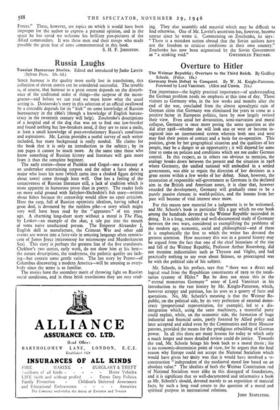Overture to Hitler
The Weimar Republic; Overture to the Third Reich. By Godfrey Scheele. (Faber. 18s.)
Germany from Defeat to Conquest. By W. M. Knight-Patterson. Foreword by Lord Vansittart. (Allen and Unwin. 215.) THE importance—the highly practical importance—of understanding the German problem needs no emphasis at this time of day. Those visitors to Germany who, in the few weeks and months after the end of the war, concluded from the almost apocalyptic ruin of German cities that Germany was eliminated for years to come as a positive factor in European politics, have by now largely revised their view. Even amid her devastation, semi-starvation and moral collapse, Germany is once more posing the same question as she did after 1918—whether she will look east or west or become in- tegrated into an international system wherein both east and west may find their points of contact and a basis for co-operation. This position, given by her geographical situation and the qualities of her people, may be a danger or an opportunity ; it will depend for some time to come on policies and conditions which are not under German control. In this respect, as in others too obvious to mention, the analogy breaks down between the present and the situation in 1918 where Germany, the unified national will embodied in a settled government, was able to regain the direction of her destinies to a great extent within a few weeks of her defeat. Since, however, the restoration of responsible self-government to Germans is the declared aim in the British and American zones, it is clear that, however retarded the development, Germany will gradually cease to be a purely passive element in world-politics, and the lessons from her past will become of vital interest once more.
For this reason new material for a judgement is to be welcomed, and Mr. Scheele's book in particular fills a gap which no one book among the hundreds devoted to the Weimar Republic succeeded in doing. It is a long, readable and well-documented study of Germany between the two wars, considered as exemplifying the problems of the modern age, economic, social and philosophical—and of these it is emphatically the first to which the writer has devoted the greatest attention. How necessary this was in a general history may be argued from the fact that one of the chief historians of the rise and fall of the Weimar Republic, Professor Arthur Rosenberg, did not mention industrialists such as Thyssen and Vogler, and had practically nothing to say even about Stinnes, so preoccupied was he with the political side of his subject.
Mr. Scheele, in his preface, says that " there was a direct and logical road from the Republican constituents of 1919 to the totali- tarian tyranny of Hitler." But he does not mean this in the " eternal monstrous Germany " sense of Lord Vansittart in his introduction to the vast history by Mr. Knight-Patterson, which, however scrappy and partisan, has its uses as a quarry of facts and quotations. No, Mr. Scheele's meaning is that the Weimar Re- public, on the political side, by its very perfection of external demo- cracy (proportional representation, for example), led to a dis- integration which, using the same machinery, a masterful party could exploit, while, on the economic side, the formation of huge industrial and financial units, partly fostered by Allied policy and later accepted and aided even by the Communists and their Moscow patrons, provided the means for the prodigious rebuilding of German power. In all this there are many lessons for today to which only a much longer and more detailed review could do justice. Towards the end, Mr. Scheele brings his book back to a moral thesis ; his is no economic-determinist point of view, for he argues that the final reason why Europe could not accept the National Socialism which would have given her Unity was that it would have involved a 'e- construction " independent of the mediaeval moral law based on an absolute value." The idealists of both the Weimar Constitution and of National Socialism were alike in this disregard of foundations, and it is significant that so well-documented and informative a book as Mr. Scheele's should, devoted mainly to an exposition of material facts, by such a long road return to the question of a moral and spiritual purpose in international relations.
JOHN STAPLETON.


































 Previous page
Previous page